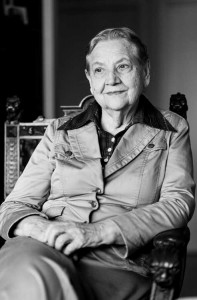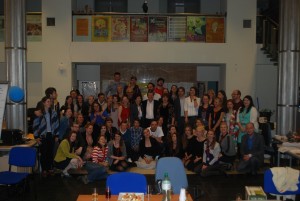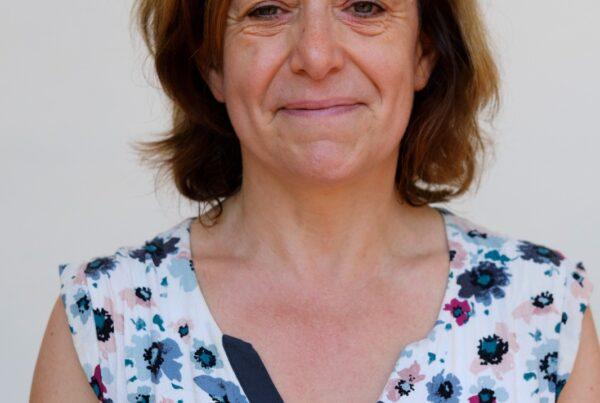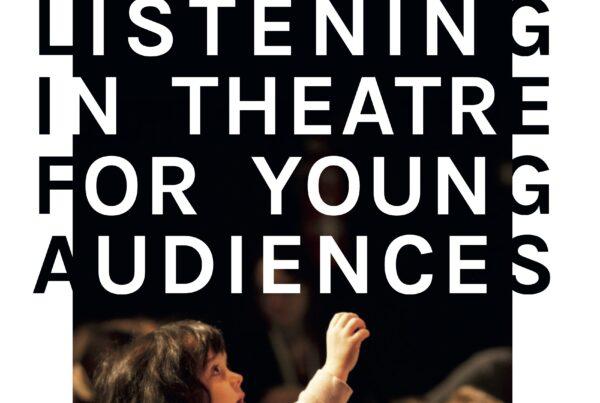by Prof. Henryk Izydor Rogacki
Excerpt from publication “25 years of Polish ASSITEJ”, 2006
Halina Machulska is an actress, teacher, educator, theatre director, co-founder of an acting school—a legendary figure both of Polish theatre with its sense of mission, and of the amateur theatre movement. A personality endowed with a charisma of a successful leader. The wife of Jan Machulski and the mother of Juliusz Machulski, she has always been a shining star on her own, and not reflecting somebody else’s brilliance. She is an unusual phenomenon, made up, I daresay, of female authority, motherly tenderness, magical womanly charm and puckish appeal of a born comedian.
In 1984 Halina Machulska was elected the President of the Polish Centre of ASSITEJ.
The Polish Centre of ASSITEJ was registered in March 1981, in the atmosphere of regained hope, so characteristic for the period of the so-called Solidarity carnival. The originator of the idea of establishing the Polish Centre of ASSITEJ was Janusz Warmi?ski, the then head of the Polish ITI.
Halina Machulska seemed well prepared and predestined for her role in the Association,
most of all, because of her work and achievements at the Ochoty Theatre in Warsaw.
She started this theatre together with her husband, Jan Machulski in 1970 at one of Warsaw’s community centers. They wanted their theatre, also called the Centre of the Spectator or the Centre of Theatre Culture, to be different from all other theatres, even at the cost of becoming something different than theatre. A particular feature of this initiative was that after each performance the artists met with an audience to talk, to hold discussions, disputes and debates. It became a ritual, complementing the performance.
The Ochoty Theatre was often called ‘the theatre of the moral stance’, ‘the theatre without
a stage’, ‘the theatre among an audience’, ‘the theatre of dialog’, or ‘the poor theatre’.
The Ochoty Theatre was the only Polish professional theatre that set itself and consistently fulfilled the goal of staging plays for children and young people Moreover, Halina and Jan Machulski involved young people in other theatre productions, giving them various acting tasks. These lucky young actors were recruited from the Drama Centre of the Ochoty Theatre. It was a place where children and young people could find moral, aesthetic and intellectual education to become later theatre instructors or intellectuals active in many spheres of social life. The theatre also trained amateur groups and popularized drama as a method of educating and teaching through theatre.
In 1984 the Ochoty Theatre became the seat of the Polish Centre of ASSITEJ in Warsaw. Sharing the space, strengthened by the personal union of directors of both institutions, proved
extremely beneficial for new initiatives. For example in 1988 ASSITEJ organized a playwriting competition called “Looking for the Polish Shakespeare”. A year later the Ochoty
Theatre opened the Debut Stage, and 1986 saw the first regular courses in educational
drama for teachers. In 1994 ASSITEJ organized the first edition of the International “Korczak” Festival of Theatres for Children and Young People. Choosing the name of Janusz Korczak is very significant. It is not only a reminder of and a tribute to the heroism of the “old doctor” and his deed, but also a reference to his educational practices, ideas and his most simple philosophy of human being that found its embodiment in art as well.
In 1996 Halina and Jan Machulski resigned from running the Ochoty Theatre. ASSITEJ
had to leave its long established seat and after a period of searching for a new place and
improvised arrangements, in the year 2002 it settled at the Copernicus Astronomical Centre
PAN in Warsaw, together with the Machulski Acting School, “At the Machulski’s” Drama Centre, “Looking for the Polish Shakespeare” and “Young Translators” competition committee, drama in education courses office and the organizing committee of the Korczak Festival.
translation Sylwia Kolczy?ska
I don’t know hwat he wants to say with this. Maybe cut the first part of this sentence and start with „The Ochoty Theatre”
My Favourite Project
by Maciej Wojtyszko
There’s a long tradition of ASSITEJ theatre camps in Poland. An astonishing number of small projects are realised at each camp (at least two each day) and they provide an opportunity for young people aged 16 -22, who during the school year attend drama clubs, theatre schools or are award winners of drama competitions, to come together.
As a member of the jury, a director and children’s playwright it was with great pleasure that I participated in these camps, for even though I had to dedicate two weeks of my holiday they also delivered so much positive energy and material for consideration, that looking back now I can’t be sure whether I taught others more or whether I actually learnt more. (Particularly during the camps to which I took my own children when they were growing up.)
An especially valuable aspect of the camps was that apart from being given a lot of theoretical advice, teenage playwrights were able to see how their texts sounded in public.
And so it was, until one year Poland became part of the European Union.
During one of the camps we realised that there are many Polish teenagers living outside of Poland who are looking for contact with Polish culture.
We decided to help them in this. Each year we run the “Young translators” competition, the rules of which are really ever so straightforward. To enter, the contestant must choose a short single page of literature from the country they currently live in and translate it into Polish, additionally they also need to submit a second page of translation of Polish literature into the language of that country.
The best translators are then invited to take part in our camps. A translator who can see the aesthetic value of a text is a treasure and worth looking after from a young age!
After eight years of this competition I am proud to be able to say that we have “our own” translators of Polish literature in Italy, Lithuania, Ukraine, Belorussia, Germany, Czech, Great Britain and Paraguay.
Furthermore, they know contemporary Polish playwrights personally and are aware of what is happening in theatre in Poland and in their own, adopted countries.
Obviously, the first thing is to have well-organised and carefully considered youth theatre camps. However, once this step has been achieved I can sincerely recommend the “young translators” project to every country. Our modern day Tower of Babel has long way to go yet in overcoming problems in translating literature and no computer programme will ever be able to take the place of a sensitive, creative translator.
There is no patent for this project.






